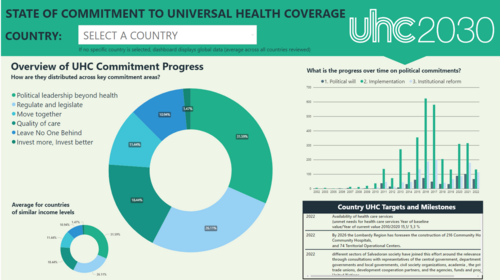Global health leaders and stakeholders gathered in Berlin last...
5 December 2022
UHC2030 renewed the UHC Data Portal to add brand new country profiles

In less than one year, the High-Level Meeting on Universal Health Coverage will take place at the United Nations General Assembly. The 2023 High-Level Meeting on UHC provides countries and all stakeholders an opportunity to reinvigorate progress towards UHC, with action-oriented outcomes to strengthen health systems and that provide the basis for implementation and accountability, building on the 2019 Political Declaration.
On December 5, UHC2030 renewed the UHC Data Portal to add new country profiles (progress dashboard) based on the State of UHC Commitment review in 2021 and 2022, which provides data sets and data visualization on health systems and the state of UHC commitment in 139 countries*. The country profiles include an overview on 1) UHC commitment progress; 2) global UHC indicators and related data; 3) institutional efforts; 4) priorities in UHC progress and equity across population groups; 5) public perception and social participation; and 6) stakeholder collaboration.
The State of Commitment to UHC review the 2019 UHC Political Declaration’s Key Targets, Commitments and Follow-up Actions and supports national accountability and advocacy processes to ensure political leaders are held accountable for their UHC commitments.
We hope that these country profiles are useful and used by health experts and governments, civil society organizations, academia, parliamentarians, private sector and media. The country profiles can contribute to and complement the formal accountability processes in countries.
The key findings of the State of Commitment to UHC review 2021-2022 will be available in January 2023. To receive updates, please sign up to the UHC2030 newsletter or follow us on Twitter and LinkedIn.
*139 countries (about 70% of UN member states) were included in the 2021-2022 State of UHC Commitment review from 45 UN HLPF Voluntary National Review (VNR) countries in 2016-2019 and 94 VNR countries in 2020-2022.
